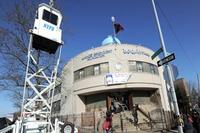-
Syria’s chemical weapons stocks will not be attacked
Military analysts say Syrian president Bashar Assad will emerge with Syria’s chemical arsenal intact if the United States executes a limited airstrike. The United States contemplates a punitive strike in response to Syria’s use of chemical weapons against Sunni civilians on 21 August – and on about a dozen earlier occasions – but the U.S. attack, if it comes, is not likely to include the depots where the chemical weapons are stored because such an attack may release deadly gases which would cover the neighboring areas with toxic clouds, potentially creating a human and environmental disaster.
-
-
NYPD designated all NYC mosques as terrorist organizations to facilitate broad surveillance

The New York Police Department (NYPD) secretly labeled entire mosques in New York as terrorist organizations, allowing the NYPD to use surveillance techniques including informants and spies without needing evidence or proof of criminal or terrorist activities to investigate the mosques. The investigations, known as Terrorism Enterprise Investigations (TEI), began after the 9/11 attacks on New York City and the Pentagon.
-
-
Flexible vehicle-arrest system stops cars involved in crime, terrorism

Researchers have developed a mathematical model that could help engineers design a flexible vehicle-arrest system for stopping cars involved in criminal activity or terrorism, such as suspect car bombers attempting break through a check point, without wrecking the car or killing the occupants.
-
-
Budget cuts force changes in CIA’s document declassification policy
Sequestration-mandated budget cuts forced the CIA to close its Historical Collections Division office, which declassifies historical documents. Instead, the division’s responsibilities will be transferred to the office that handles Freedom of Information Act (FOIA) requests. “This is very unfortunate,” said Robert Jervis, a Columbia University professor who chairs the CIA’s Historical Review Panel. “There will be fewer releases. We shouldn’t fool ourselves.”
-
-
Worries grow about Syria’s biological weapons capabilities, intentions
The debates among experts in Western and Middle Eastern intelligence services and militaries about the use of chemical weapons by the Assad regime revolve around how many times Assad has used chemical weapons, not whether such weapons were used. Neighbors of Syria have become increasingly alarmed – and, in private, have expressed their anxiety in discussions with the United States – about another illicit Syrian WMD program: biological weapons. The readiness of the Assad regime to use one proscribed weapon – chemicals — has led to growing unease among Syria’s neighbors that the regime may not find it too difficult to violate other weapon-related taboos. Biological weapons could give the Assad regime an effective means of retaliation because, if the weapon is well-designed, the lethal contents would spread easily without leaving tell-tale signs about the origin of the attack – or even evidence that there has been an attack.
-
-
Jewish Federations’ security arm stresses awareness on High Holidays
Security awareness should be a primary consideration for synagogues during the High Holidays, the security arm of the national Jewish community said. Synagogue staff, security volunteers and greeters should be on the lookout for suspicious persons or activity around their facilities, particularly during services and other gatherings,” the Secure Community Network (SCN) said in a statement posted Wednesday on its Web site, hours before the start of Rosh Hashanah.
-
-
Administration's Syria plan: limited operation with “downstream” effect
Three leading administration officials yesterday presented, in general detail, the plan of attack on Syria. The plan emphasizes the destruction of delivery vehicles – missiles, rockets, planes and their airfields, and artillery pieces – used in the delivery of chemical weapons. The three officials – Kerry, Hagel, and Dempsey — agreed that such an attack, even if its purpose would be to degrade the regime’s ability to deliver chemical weapons, would have “downstream” effect: these delivery vehicles also deliver conventional munitions, so their destruction would more generally degrade the regime’s ability to fight, thus making the battlefield between the regime and the rebels more level. The Senate Foreign Relations Committee is today drafting a new resolution which would permit up to ninety days of military action against the Syrian government and bar the deployment of U.S. combat troops in Syria but permit the deployment of a small rescue mission in the event of an emergency. The White House also would be required within thirty days of enactment of the resolution to send lawmakers a plan for a diplomatic solution to end the violence in Syria.
-
-
Fusion centers collect information on non-threatening groups

Since the 9/11 attacks, federal and state surveillance of nonviolent student groups, protest movements, and mosques has increased along with the growth of fusion centers. Fusion centers serve as the focal points for the receipt, analysis, gathering, and sharing of threat-related information. According to DHS, there are fifty-three primary fusion centers and twenty-five recognized fusion centers across the United States.
-
-
Police’s facial recognition program becomes a political issue in Ohio
Attorney General Mike DeWine of Ohio confirmed last week that local and state law enforcement have used facial recognition software since June of this year to match images of potential suspects and victims to pictures on the state’s drivers’ licenses and mug shots. The Democratic challenger for the Attorney General post faulted DeWine’s office for launching the program on 6 June without any public notice.
-
-
Security vs. privacy
Those who ask you to choose security or privacy and those who vote on security or privacy are making false choices. That’s like asking air or water? You need both to live. Maslow placed safety (of which security is a subset) as second only to food, water, sex, and sleep. As humans we crave safety. As individuals and societies, before we answer the question “security or privacy,” we first have to ask “security from whom or what?” and “privacy from whom and for whom?”
-
-
White House seeks broad Syria mandate
President Barack Obama and top administration officials described the proposed military strike against Syria as limited in scope, intended to send a signal to Syria that the use of chemical weapons will not be tolerated rather than change the balance of forces in the Syrian civil war. The language of the proposed authorization of force, however, for which the White House is seeking congressional support, appears to be asking for a much broader authority.
-
-
U.S. “black budget” reveals unwieldy bureaucracy, misplaced priorities: expert
Classified budget figures and successes and failures by American intelligence agencies, exposed for the first time this week by the Washington Post, show a massive bureaucracy with misplaced priorities, according to a cybersecurity and privacy expert. “The major failure identified in all of the post-9/11 assessments was a ‘failure to connect the dots,’” the expert said. “Nevertheless, the vast majority of the black budget is being spent on data acquisition — collecting more dots — rather than analysis.”
-
-
Lawmakers mull oversight of U.S. cyberattack capabilities and operations
There has not yet been a public discussion of U.S. offensive cyberattack capabilities — and of actual U.S. cyberattacks — and the subject had been classified until a few years ago. Even after the subject came more into the open, only the fact that the United States had the capability to initiate offensive cyberattacks was acknowledged. With the growing attention to cyber operations – both defensive and offensive — the question of oversight is set to follow.
-
-
Privacy board wants Feds to update security agencies’ operating rules
The independent Privacy and Civil Liberties Board says U.S. national security agencies are operating under outdated rules which should be revised to reflect advances in technology.The oversight board says that rules governing collection and retention of data about Americans need be revised to “appropriately capture both the evolution of technology and the roles and capabilities of the intelligence community since 9/11.”
-
-
Kerry leaves no doubt: U.S. will attack Syria within days, no UN approval sought
In a speech today, Secretary of State John Kerry left no doubt that the Obama administration, within days at most, will launch a series of attacks against the Assad regime for attacking Syrian Sunni civilians with chemical weapons. The chemical attack – not the first one by the regime this year — killed 1,429 people, including 426 children. Kerry said punishing the offending regime was not only the right thing to do morally, but it is essential to protect U.S. national interest and the interests of U.S. allies. The administration has circulated a report, prepared by the U.S. and U.K. intelligence communities, detailing the evidence pointing to the Assad regime’ responsibility for the chemical attack. Kerry: we “make our own decisions on our own timelines, based on our own values and interests”
-
More headlines
The long view
Preventing Another 'Jan. 6' Starts by Changing How Elections Are Certified, Experts Say
The 2024 presidential election may be a rematch between President Joe Biden and former President Donald Trump, but preventing a repeat of Jan. 6, 2021 — when false claims of a stolen election promoted by Donald Trump and his allies led to an insurrection at the U.S. Capitol —will be top of mind this election year. Research finds broad support among public for nonpartisan certification commissions.
States Rush to Combat AI Threat to Elections
This year’s presidential election will be the first since generative AI became widely available. That’s raising fears that millions of voters could be deceived by a barrage of political deepfakes. Congress has done little to address the issue, but states are moving aggressively to respond — though questions remain about how effective any new measures to combat AI-created disinformation will be.
Chinese Government Hackers Targeted Critics of China, U.S. Businesses and Politicians
An indictment was unsealed Monday charging seven nationals of the People’s Republic of China (PRC) with conspiracy to commit computer intrusions and conspiracy to commit wire fraud for their involvement in a PRC-based hacking group that spent approximately 14 years targeting U.S. and foreign critics, businesses, and political officials in furtherance of the PRC’s economic espionage and foreign intelligence objectives.
European Arms Imports Nearly Double, U.S. and French Exports Rise, and Russian Exports Fall Sharply
States in Europe almost doubled their imports of major arms (+94 per cent) between 2014–18 and 2019–23. The United States increased its arms exports by 17 per cent between 2014–18 and 2019–23, while Russia’s arms exports halved. Russia was for the first time the third largest arms exporter, falling just behind France.
LNG Exports Have Had No Impact on Domestic Energy Costs: Analysis
U.S. liquified natural gas (LNG) exports have not had any sustained and significant direct impact on U.S. natural gas prices and have, in fact, spurred production and productivity gains, which contribute to downward pressure on domestic prices.
